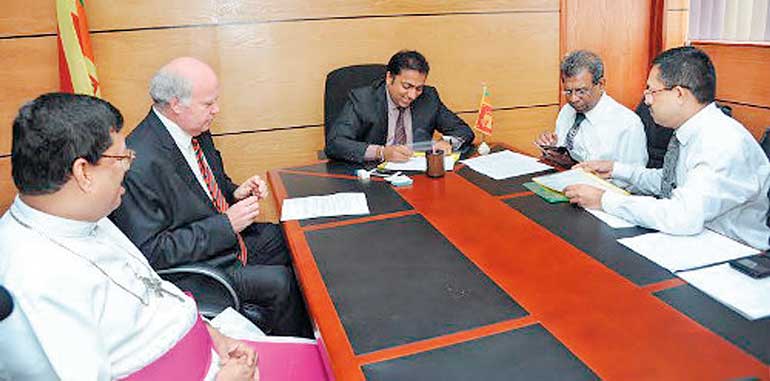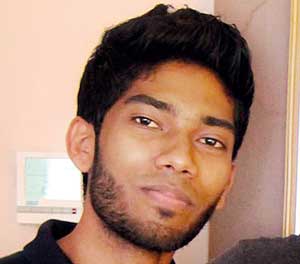Friday Feb 27, 2026
Friday Feb 27, 2026
Thursday, 17 March 2016 00:00 - - {{hitsCtrl.values.hits}}
 An agreement was signed between Minister of Education Akila Viraj Kariyawasam and Trinity College Kandy Principal Andrew Foler Watt to admit the child to Trinity College, which expressed its willingness to accept the child to the school and provide uniforms, books, sports equipment and a financial support for his education
An agreement was signed between Minister of Education Akila Viraj Kariyawasam and Trinity College Kandy Principal Andrew Foler Watt to admit the child to Trinity College, which expressed its willingness to accept the child to the school and provide uniforms, books, sports equipment and a financial support for his education
By AashikNazardeen
The sad situation of the Kuliyapitiya child [although it had a promising ending] shook the whole country. “Cultural norms” were proudly brought up against the accused.
In this instance, we saw a child who was rumoured to be infected with HIV and was therefore treated with utmost disrespect with attitudes bordering on contempt and disgust. When the doors of several schools closed in the boy’s face, most of the public watched passively and helplessly.
Then again when a school admitted the ‘accused’ child after much effort by the mother, the parents of that same school took their children away, leaving this boy alone. Finally two leading schools opened their doors to the wrongly-accused child.
Nevertheless we must ask ourselves: Can the trauma and the repercussions of the discrimination which the little child faced ever be undone?
What is startling is how badly the public and several Government officials reacted to this situation. Their behaviour or rather the way in which the masses approached this situation brings to light the stains and the perverse attitudes of people in our society.
Is this situation relevant only towards the people of the said area? How would the majority of the people around Sri Lanka have reacted to a similar situation?

Youth rally to create awareness
It was promising to see the enthusiasm of people’s reaction on social media as they campaigned towards bringing justice to this child. The social media campaigns that spoke up against the young boy mostly consisted of the youth who used Facebook, Twitter and blogging platforms to voice their concern over this grave injustice.
While the older generation recklessly blamed the young boy, the youth of the nation rallied to create awareness on why they believed the HIV claims were misguided. It was enlightening to see how young people shared knowledge about HIV and HIV transmission as they tried to prove how the young boy was wrongly accused. In doing so, they played an important role in using knowledge to remove the stigma created around the young child.
One must also give due recognition to the relevant schools which opened their doors to welcome the child. All the parties involved in ensuring justice must be appreciated.
Work to end discrimination
However, the negative reaction of one particular rural area alone highlights the extent to which we need to work on ending discrimination, based on any form of stigma.
An individual (or in this case an innocent child) ‘supposedly’ infected with HIV was viewed as an object of disdain and danger. The little child was discriminated in different layers of the society, so much so that the opinions of individuals in higher ranks disgustingly suggested that the child was someone involved in a ‘crime’ (which was why he was supposedly infected with HIV.)
It was sad to see a senior public representative imply that the child must be sent to “probationary services” so as to detect whether he is indeed HIV+. Another version of the story said that the child must be separated from the mother who is rumoured to be infected with HIV so that the child is ‘protected’ from harm and ‘further transmission’.
The facts of this incident are murky areas where one knows not which version of the incident to trust. However, one fact precedes every other fact, regardless of it being proven or unproven and that is the extent to which social stigma could jeopardise lives.
Poor health knowledge
One of the many reasons for this reaction is easily the poor knowledge of heath in some areas.
According to the National Human Development Report (NHDR) 2014, the National Youth Survey (2013) results show that knowledge of the availability of sexual and reproductive health services was 55%. This means that a majority of the population is gravely unaware of safe sexual health, diseases, etc.
The NHDR also goes on to state that social-cultural norms hold particular influence over sexual and reproductive health and mental health issues.
Because a lot of young people rely on their parents, spouses and friends for advice, a lot of health-related information is misleading. Such ignorance reflects the actions that took place in Kuliapitiya and proves the misguided behaviour of the villagers in that area.
Stigma surrounding AIDS is not unique to this part of the world alone. A study by UNAIDS (2015) ‘On the Fast-Track to end AIDS by 2030: Focus on location and population’ suggests that “In 35% of countries with available data, over 50% of men and women report having discriminatory attitudes towards people living with HIV”.
However, this instance sadly shows to what extent such stigma could harm an individual’s life and drive an entire community towards heartless and thoughtless behaviour. This single incident calls forth our attention towards several attitudinal changes that we as a country need to undergo.
Reaction to similar incidents could vary from part to part in the country. But as one people under the sovereignty of mother Sri Lanka, we hold responsibility towards each other and of each other; towards educating, creating awareness, stopping discrimination and to heal our motherland of the numerous prejudices and injustices.
Let us not let ignorance stain our beautiful culture which is embedded on hospitality, kindness not only towards humans but towards all living beings and the compassion surpassing any forms of difference that even our National Anthem sings of, be cherished and preserved.
The incident at Kuliyapitiya is a fine example of the many trials and tribulations our nation is likely to face due to the lack of proper information and ignorance which is wrongly blamed on our “culture” and “religion”. Culture and religion are an important part of our national identity, but as we move towards the future, it is important that we act more rationally and speak with greater understanding about issues such as this.
As the youth of this country, we must look towards making sure that someday our own thoughts and decisions aren’t moulded by poorly-informed ideals. Youth should pioneer a culture of rational thinking in Sri Lankan society.
(UNLOCKED is a space for Sri Lankan youth to express their views and opinions on development with the aim of creating positive change in the world. The views expressed in the blogs are solely those of the authors. UNDP Sri Lanka and Daily FT does not represent or endorse the views expressed in these blogs. Read more about the UNLOCKED initiative www.lk.undp.org.)